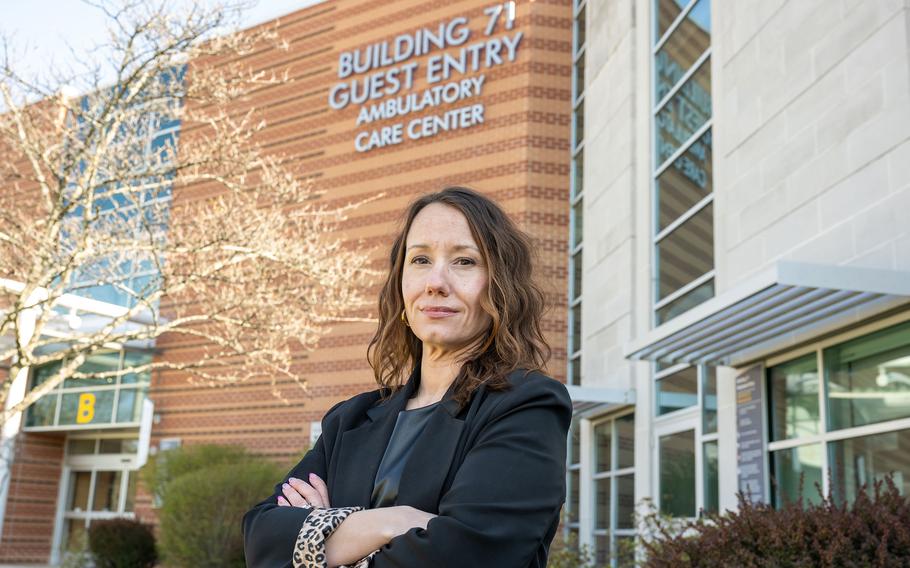
Alanna Caffas, chief executive officer of the Pittsburgh-based Veterans Health Foundation, poses outside a VA hospital in Pittsburgh on April 9, 2025. (Lucy Schaly, Pittsburgh Post-Gazette/TNS)
PITTSBURGH (Tribune News Service) — One hundred years ago, scientific research began at the U.S. Department of Veterans Affairs, eventually yielding discoveries like the implantable pacemaker, the nicotine patch and the concept of a CT scan.
This spring, the National Association of Veterans’ Research and Education Foundations thought it would be prioritizing planning a 100th anniversary celebration of such research.
Instead, VA research foundations around the country are dealing with “unintended consequences” of a federal hiring freeze, mandated by a Jan. 20 White House executive order, which has left some research studies unable to proceed without essential personnel. The situation is particularly frustrating, say researchers, because many of the employees affected aren’t paid by the VA.
“They are not saving any money,” said Alanna Caffas, chief executive officer of the Pittsburgh-based Veterans Health Foundation, which is congressionally chartered to administer private and non-VA federal research grants at VA medical centers. The foundation supports work mainly in Pittsburgh, but also at VA facilities in Wilkes-Barre, Pennsylvania, and Wilmington, Delaware.
Unlike hiring freezes issued by previous administrations, this one affects researchers from other institutions, foundations or private industry who work at the VA through WOC, or “without compensation” appointments.
“We have had to delay the enrollment of veterans into clinical trials because we have lost the people who are integral for the coordination of the projects,” said Caffas. “The last two months have been filled with fear and anxiety.”
Currently, a study investigating the use of ultrasound technology to predict stroke risk by examining blood vessels in the neck is on hold. Two ultrasound technicians work on the study under WOC appointments that expired and cannot be renewed during the hiring freeze.
The ultrasound technicians are employees of the University of Pittsburgh and are not paid by the VA, but they cannot work on the study without WOC appointments. “Without them, the project cannot continue,” said Caffas.
Other studies taking place at the VA in Pittsburgh have been affected as well. The Veterans Health Foundation had to delay enrollment into two clinical trials for advanced cancers because WOC appointees weren’t renewed. Behaivior, an East Liberty tech company that develops tools to support veterans in addiction recovery, has been short-staffed since February when a researcher paid by an National Institutes of Health grant lost her access to the VA after her WOC appointment expired.
WOC appointments usually last two to three years and expire on a rolling basis. The appointments are renewed if the studies are continuing, and some employees work under WOC appointments at the VA for a decade or more.
Last month, the VA adjusted its policy to prevent further disruptions to research because of WOC appointments expiring.
“To ensure all mission-critical VA research efforts continue uninterrupted, VA on March 7 extended for 90 days the terms of all research employees whose appointments are due to expire within the next 90 days,” the VA said in a statement in response to the Post-Gazette. “This extension, which includes NTE [’not to exceed’] and WOC employees, will ensure continuity of all research efforts while VA conducts a comprehensive assessment of ongoing research initiatives to evaluate their impact on Veteran health care.”
After months of effort, the researcher at Behaivior was reinstated this week, said founder and CEO Ellie Gordon. The Veterans Health Foundation was also able to recently reinstate the employees working on the cancer studies. But some WOC appointees whose terms expired prior to March 7 — such as the ultrasound techs — are still unable to work.
Researchers and administrators are also unclear as to whether the extension will be renewed. “We don’t know what happens after 90 days,” said Rashi Venkataraman Romanoff, chief executive officer of the National Association of Veterans’ Research and Education Foundations, based in Washington, D.C.
Nationwide, there are about 3,800 VA researchers on time-limited appointments, said Romanoff, who estimates that about 300 to 400 people were affected by the hiring freeze preventing the renewal of their appointments.
The VA’s system of using temporary appointments to hire researchers paid by other sources is generally considered to be highly cost-effective, said Romanoff, noting that the VA is then able to use the employees’ research expertise without paying for the overhead of supporting them as full-time staff.
“It seems like if you are trying to save money, this isn’t necessarily the place I would start with in terms of doing things dramatically differently,” she said.
The VA has been closely intertwined with academic medicine and research since just after World War II, said Romanoff, when innovative partnerships were developed to treat the influx of injured soldiers coming back from the war. Those partnerships led to discoveries such as the first liver transplant in a patient who survived the operation, performed in 1963 at the VA Hospital in Denver by Dr. Thomas Starzl, who moved to Pittsburgh in 1981 and established a transplant legacy.
VA research in Pittsburgh contributed to the development of antiviral drugs to treat hepatitis C, said Caffas, and led to better tests to measure aphasia in patients with strokes, as well as numerous clinical trials on cancer and post traumatic stress disorder.
The VA is an attractive place for research, said Romanoff, because it is the largest integrated health care system in the country, with a population of 9 million patients all on a centralized record system. In turn, all the research going on makes the VA hospitals a desired place for veterans seeking health care.
“It’s a core, foundational component of high-quality care,” said Romanoff. “It’s why people want to go to the Mayo Clinic or St. Jude’s, to access a cutting-edge drug or get into a trial. It’s not a nice-to-have — it’s a crucial part of clinical care.”
©2025 PG Publishing Co.
Distributed by Tribune Content Agency, LLC